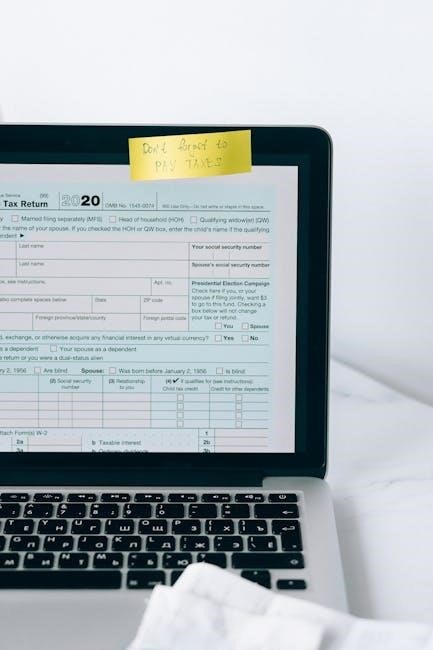The Legal Services Award Pay Guide provides a comprehensive overview of minimum wages, conditions, and entitlements for employees in the legal services industry. It helps employers and employees understand their obligations and rights under the award.
1.1 What is the Legal Services Award?
The Legal Services Award is a legal document established by Fair Work Australia, outlining minimum pay rates, conditions, and entitlements for employees in the legal industry; It applies to various roles, including legal clerks, administrative staff, and other support personnel. The award ensures fair compensation and regulates working conditions to maintain industry standards. It covers full-time, part-time, and casual employees, providing a framework for wages, hours, leave, and allowances. Employers must adhere to its provisions to ensure compliance with labor laws. The Legal Services Award is regularly updated to reflect changes in legislation and industry needs, ensuring it remains relevant and fair for all parties involved.
1.2 Importance of Understanding the Pay Guide
Understanding the Legal Services Award Pay Guide is crucial for both employers and employees to ensure compliance with legal obligations and fair workplace practices. It provides clarity on pay rates, allowances, and entitlements, helping employers avoid underpayment issues and legal penalties. For employees, it ensures they receive fair compensation and understand their rights. The pay guide also helps prevent disputes by setting clear expectations for wages and working conditions. By familiarizing themselves with the guide, stakeholders can navigate the legal landscape confidently, fostering a transparent and equitable work environment. Regular updates to the guide highlight the importance of staying informed to maintain compliance and fairness in the industry.

Key Definitions and Concepts
The Legal Services Award outlines the minimum employment terms for workers in the legal industry, while the Pay Guide specifies wage rates, classifications, and related entitlements clearly.
2.1 What is the Legal Services Award?
The Legal Services Award is a legal instrument that governs the employment conditions for employees in the legal services industry across Australia. Established by the Fair Work Commission, it outlines the minimum wages, entitlements, and working conditions for staff in legal firms, including legal clerks, administrative staff, and law graduates. The award ensures fair compensation and compliance with workplace laws, providing a framework for employers to adhere to. It covers various classifications of employees based on their roles and responsibilities, ensuring equitable pay scales and benefits. Regular updates to the award reflect changes in industry standards, economic conditions, and legislative requirements, maintaining its relevance and effectiveness in protecting employees’ rights.
2.2 Who Does the Legal Services Award Cover?
The Legal Services Award applies to employees in the legal services industry, including legal firms, corporate legal departments, and government legal agencies. It covers a wide range of roles, such as legal clerks, law graduates, administrative staff, and managers. The award is designed to ensure fair pay and conditions for all employees in this sector, regardless of their specific job function. It applies to full-time, part-time, and casual employees, providing a consistent framework for employers to follow. By covering diverse roles and employment types, the award promotes equity and compliance across the legal services industry, ensuring that all workers receive appropriate compensation and benefits for their work.

Purpose and Scope of the Pay Guide
The Legal Services Award Pay Guide outlines the minimum wages, conditions, and entitlements for employees in the legal industry, ensuring compliance and fairness across all roles and employers.
3.1 Overview of the Pay Guide
The Legal Services Award Pay Guide is a detailed resource outlining wage rates, allowances, and classifications for employees in the legal services industry. It provides clarity on minimum entitlements, ensuring fairness and transparency in employment practices. The guide covers various roles, from entry-level positions to senior management, offering a structured approach to understanding pay scales. It serves as a reference for employers to ensure compliance with legal obligations and for employees to verify their compensation. Regular updates reflect changes in legislation, maintaining relevance and accuracy. The guide is essential for maintaining equitable workplace standards and fostering positive employer-employee relationships within the legal sector.
3.2 Scope of the Legal Services Award
The Legal Services Award governs employment conditions for employers and employees in the legal services industry. It applies to businesses engaged in legal practice, including law firms, corporate legal departments, and government agencies. The award covers minimum wages, hours of work, leave entitlements, and allowances for various roles. It specifically includes legal professionals, clerical staff, and other support roles within the sector. However, it excludes certain positions, such as managerial or high-income earners, and professionals covered by other awards. The scope ensures consistent and fair employment standards across the industry, promoting compliance with labor laws and fostering a balanced workplace environment for all covered employees.

Structure of the Pay Guide
The Legal Services Award Pay Guide is structured to clearly outline classifications, wage levels, pay rates, allowances, and additional provisions like overtime and penalty rates for employees.
4.1 Classifications and Wage Levels
The Legal Services Award establishes specific classifications and wage levels to ensure fair compensation for employees across the legal services industry. Classifications are based on roles, responsibilities, and qualifications, ranging from entry-level positions to senior roles. Wage levels are determined by these classifications, with higher levels reflecting greater experience or specialized skills. Employers must align employee roles with the correct classification to apply the appropriate minimum wage rates. Understanding these classifications is crucial for both employers and employees to ensure compliance with the award and to prevent underpayment. The pay guide provides detailed tables outlining each classification and its corresponding wage level, helping users navigate the structure effectively.
4.2 Pay Rates and Allowances
Pay rates under the Legal Services Award are structured to reflect the industry’s diverse roles and responsibilities. Minimum rates are outlined in the pay guide, ensuring fair compensation for employees. Allowances are additional payments for specific conditions, such as first aid duties or travel requirements. These rates and allowances are updated annually to align with economic changes. Employers must adhere to these rates to meet legal obligations. Employees can use the pay guide to verify their entitlements, ensuring transparency and fairness. The guide also details how allowances are calculated and when they apply, providing clarity for both parties. Regular updates ensure the pay guide remains relevant and compliant with industry standards.

4.3 Overtime and Penalty Rates
Overtime and penalty rates in the Legal Services Award are designed to compensate employees for work outside standard hours. Overtime applies when an employee works beyond their ordinary hours, typically attracting a higher rate. Penalty rates are paid for work on weekends, public holidays, or evening shifts, reflecting the inconvenience or additional demands of such hours. The pay guide outlines specific conditions under which these rates apply, ensuring fairness and compliance. Employers must calculate overtime and penalties accurately, using the prescribed rates in the award. Employees can refer to the guide to verify their entitlements for overtime and penalty payments, ensuring they receive correct compensation for their work. This section provides clear guidelines to avoid disputes and ensure adherence to legal requirements.

How to Interpret the Pay Guide
Interpreting the Legal Services Award Pay Guide involves understanding classifications, pay rates, and entitlements. It helps employees and employers navigate the award’s requirements accurately for fair compensation.
5.1 Understanding Classifications
Classifications in the Legal Services Award define the roles, responsibilities, and skill levels of employees, determining their pay rates and entitlements. They are based on the nature of work, qualifications, and experience. Accurate classification ensures fair compensation and compliance with the award. Employers must classify employees correctly to avoid underpayment or overpayment. Classification levels typically range from entry-level to senior roles, with each level reflecting increasing complexity and expertise. Understanding these classifications is essential for both employers and employees to navigate the pay guide effectively and ensure alignment with job duties and expectations. Proper classification promotes equity, transparency, and adherence to legal standards in the workplace.
5.2 Calculating Your Pay Rate
Calculating your pay rate under the Legal Services Award involves understanding your classification level, which determines your minimum wage. Start by identifying your role’s classification from the award’s predefined categories, which are based on job duties and responsibilities. Once classified, refer to the corresponding wage rate in the pay guide. Ensure you account for any applicable allowances, such as overtime or specific work-related entitlements. Employers must adhere to these rates to comply with legal obligations. Accurate calculation ensures fair compensation and prevents disputes. If uncertain, consulting the Fair Work Ombudsman or relevant resources can provide clarification and guidance.

Importance of Compliance
Compliance with the Legal Services Award is crucial for employers to avoid legal penalties, ensure fair employee treatment, and maintain workplace integrity. It fosters trust and stability.
6.1 Legal Obligations for Employers
Employers must adhere to the Legal Services Award to ensure compliance with minimum wage rates, classifications, and employment conditions. They are required to accurately classify employees, maintain proper records, and provide payslips. Employers must also meet obligations related to overtime, penalty rates, and allowances. Failure to comply can result in legal action, fines, and reputational damage. Employers must stay informed about award updates and ensure all policies align with the Legal Services Award. Understanding and fulfilling these obligations is essential to avoid breaches and maintain a fair, lawful workplace environment.
6.2 Consequences of Non-Compliance
Non-compliance with the Legal Services Award can lead to severe penalties for employers. Fines and financial penalties may be imposed for underpayment of wages or failure to meet award conditions. Employers may face legal action from employees or regulatory bodies, such as the Fair Work Ombudsman. Reputational damage can also occur, impacting business relationships and client trust. Additionally, non-compliance can result in back-pay orders, requiring employers to compensate employees for underpaid amounts. It is crucial for employers to adhere to the award to avoid these consequences and maintain a compliant, ethical workplace environment.
The Legal Services Award Pay Guide is essential for ensuring fair wages and compliance. It provides clarity on entitlements, promoting a transparent and equitable workplace environment for all employees.
7.1 Key Takeaways
The Legal Services Award Pay Guide is a vital resource for understanding wage rates, classifications, and entitlements in the legal industry. It ensures fairness and transparency by outlining minimum pay rates, overtime provisions, and allowances. Employers must adhere to these standards to avoid penalties and maintain compliance. Employees can use the guide to verify their pay and understand their rights. Regular updates ensure the guide reflects current industry standards and legal requirements. By referencing this document, both parties can navigate workplace obligations confidently, fostering a fair and equitable work environment. Compliance with the guide is essential for maintaining trust and integrity in employer-employee relationships.
7.2 Final Thoughts on the Pay Guide
The Legal Services Award Pay Guide serves as a cornerstone for fairness and compliance in the legal industry. It provides clear guidance on pay rates, classifications, and entitlements, ensuring transparency for all stakeholders. Employers and employees alike benefit from its structured approach, which simplifies complex wage requirements. Staying informed about updates is crucial to maintain compliance and fairness. Non-compliance can lead to legal consequences, making it essential for employers to adhere to the guide. By understanding and applying the pay guide, workplaces can foster trust, equity, and productivity. It remains a vital resource for navigating the legal services sector’s wage landscape effectively.

Leave a Reply
You must be logged in to post a comment.